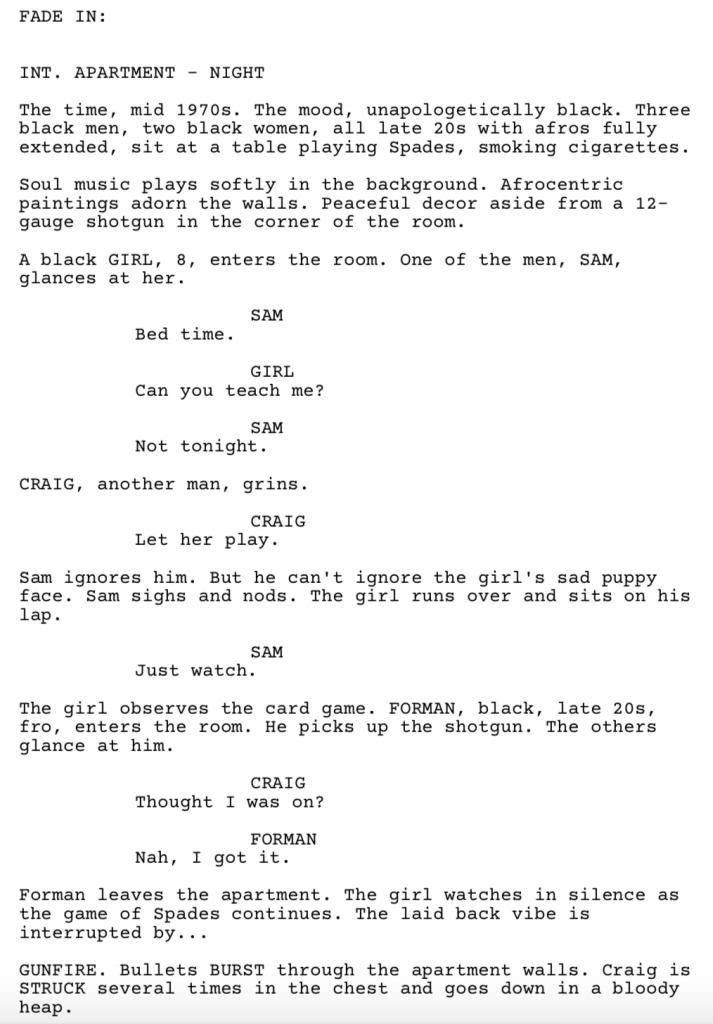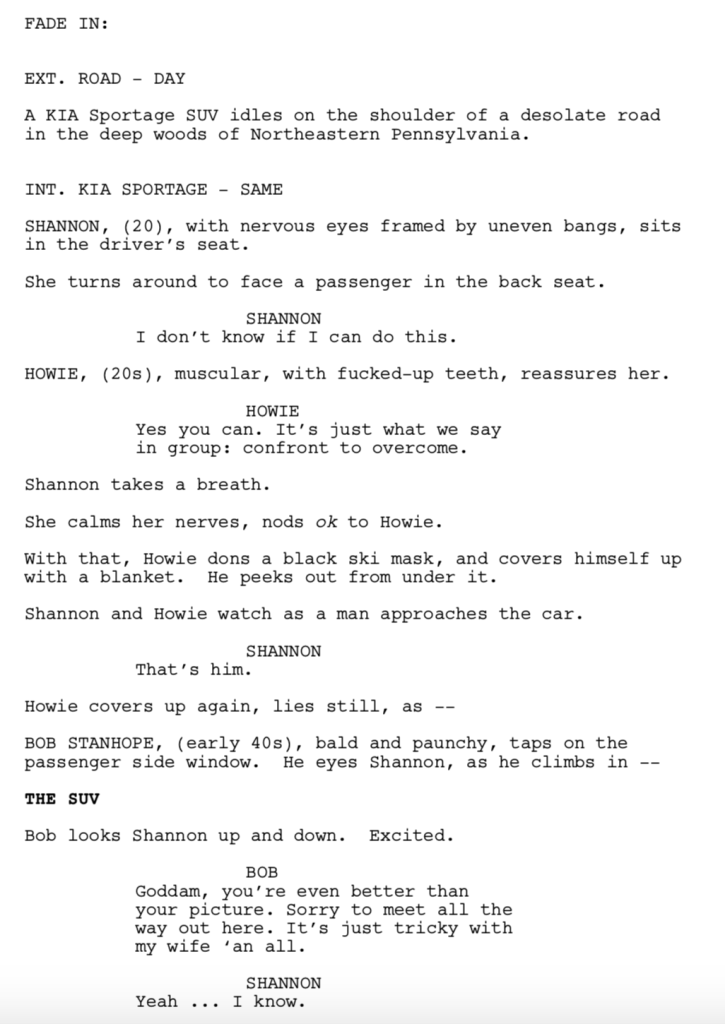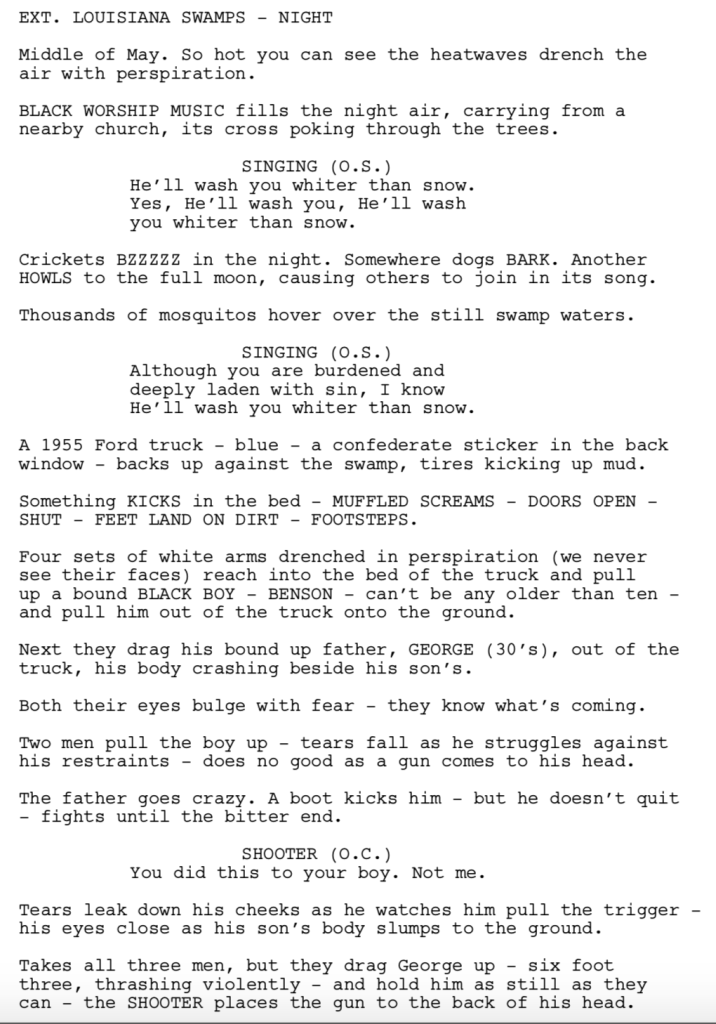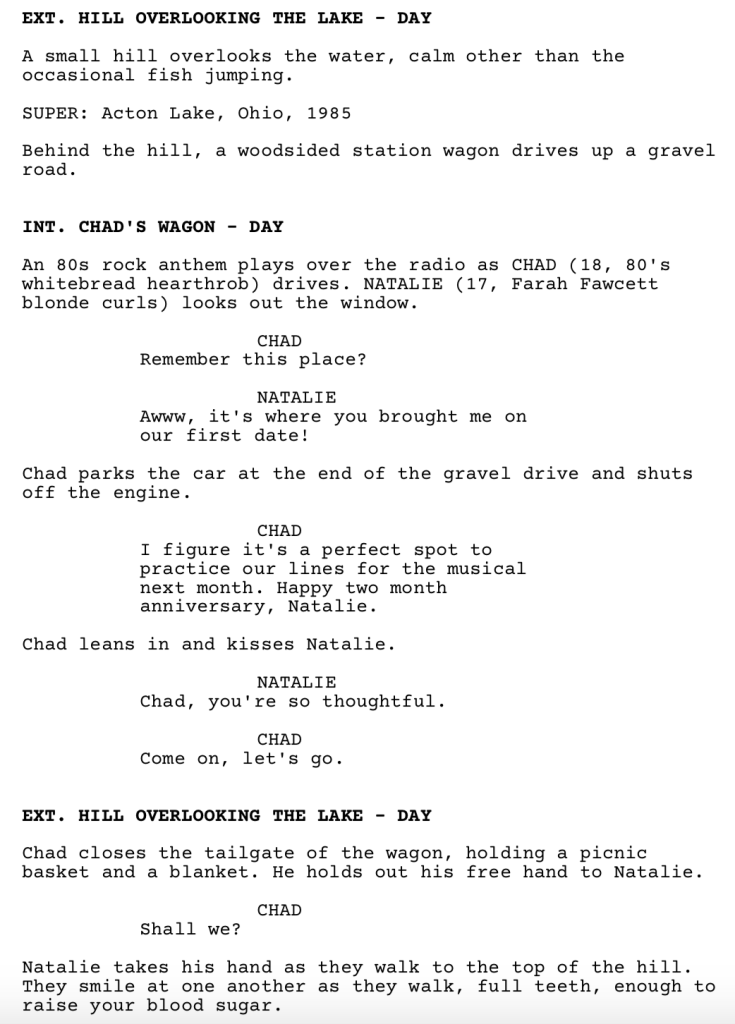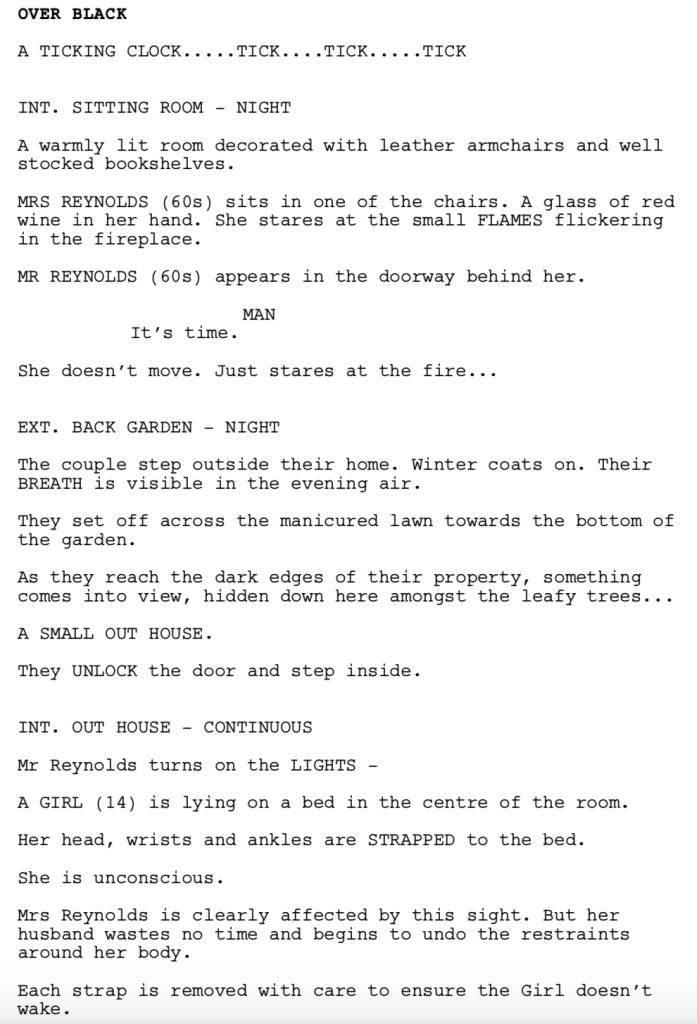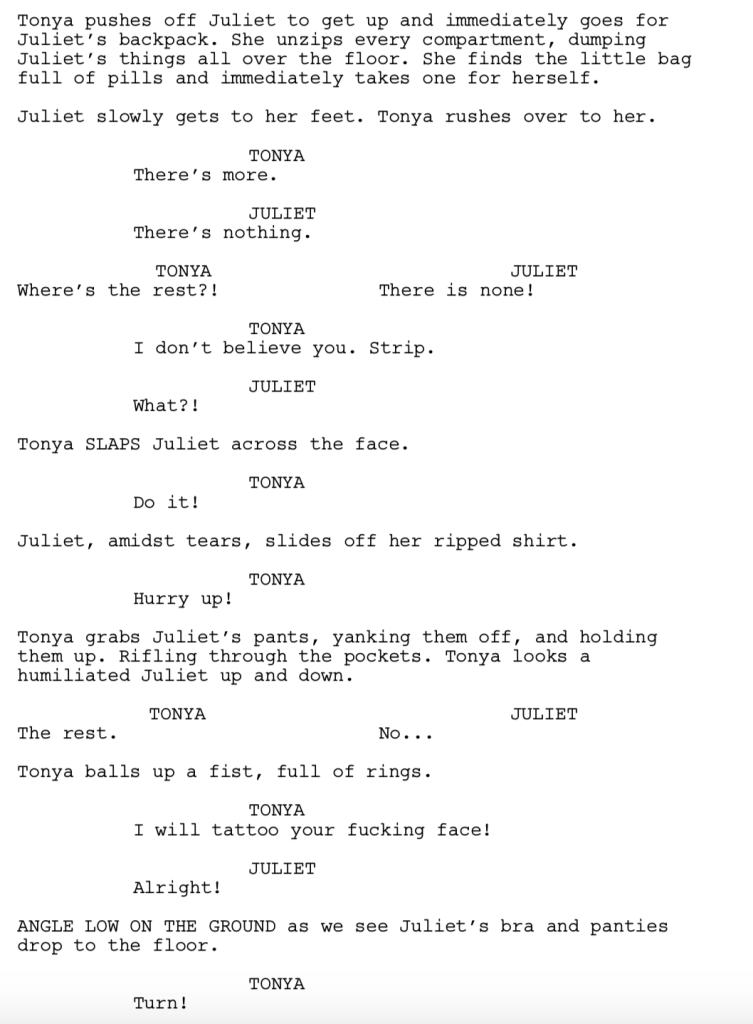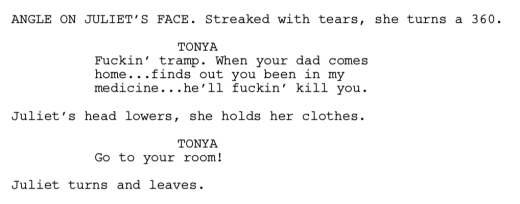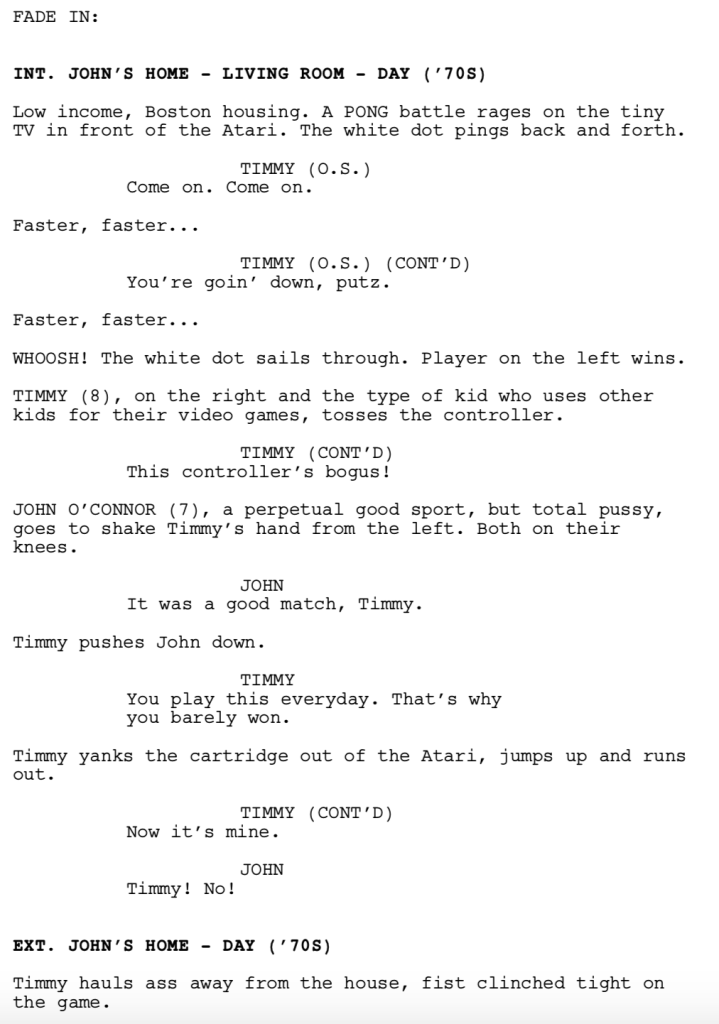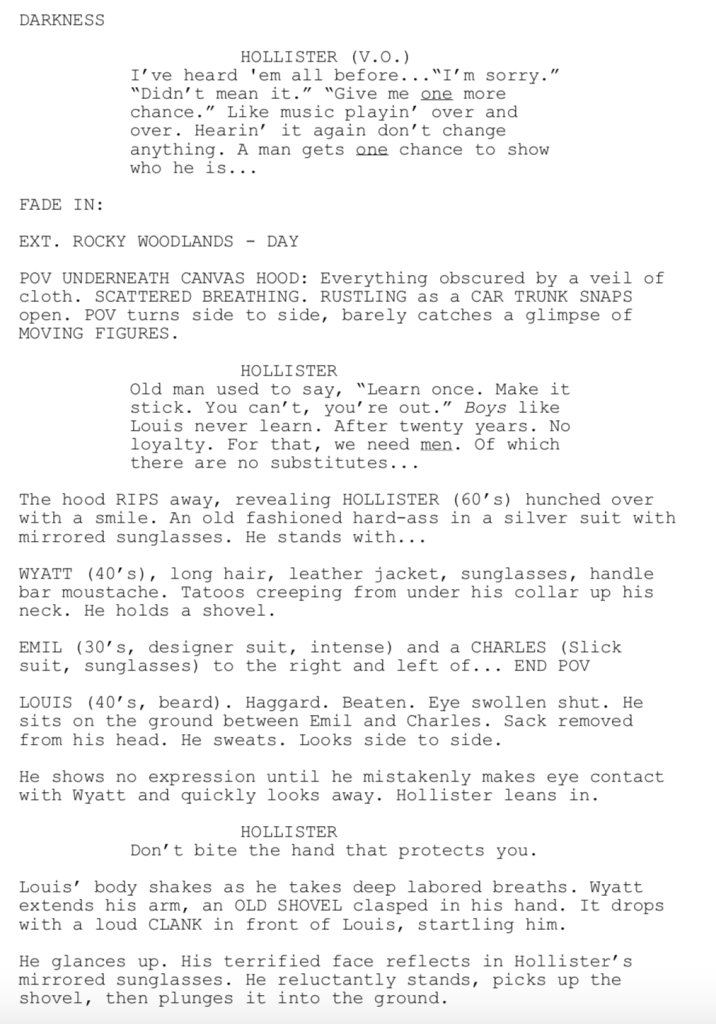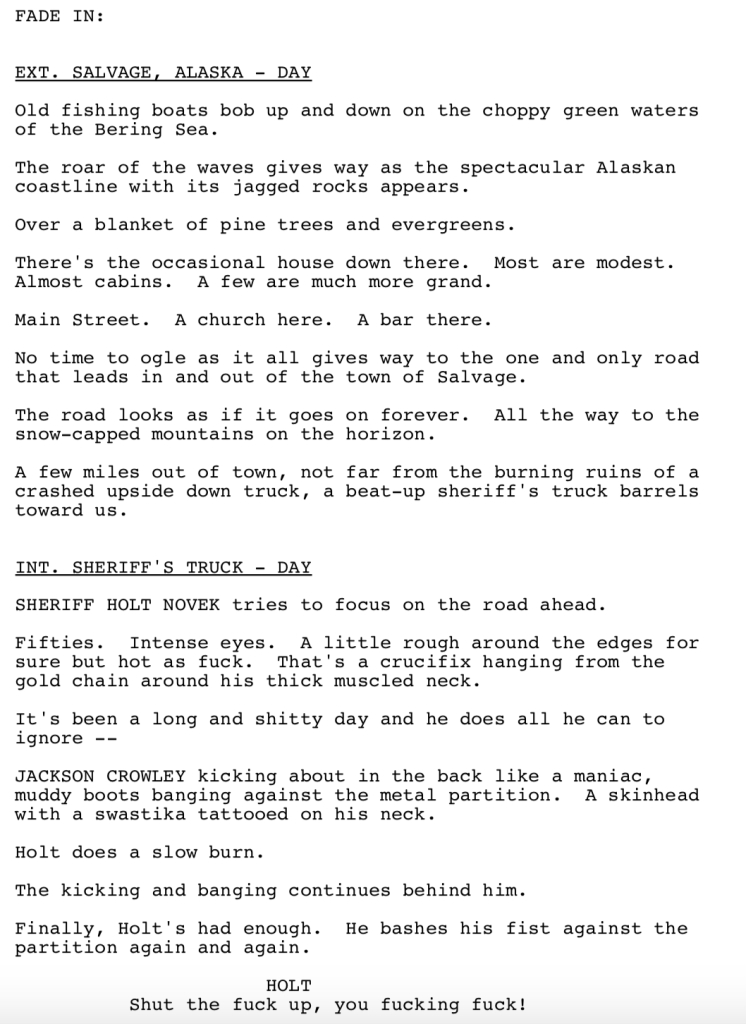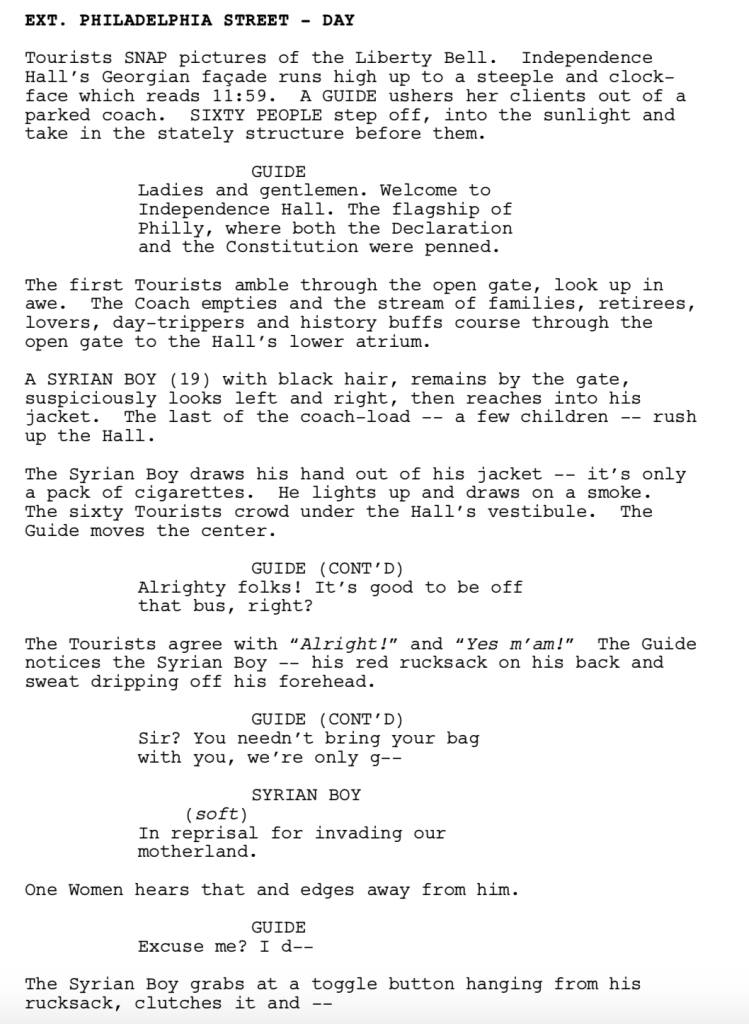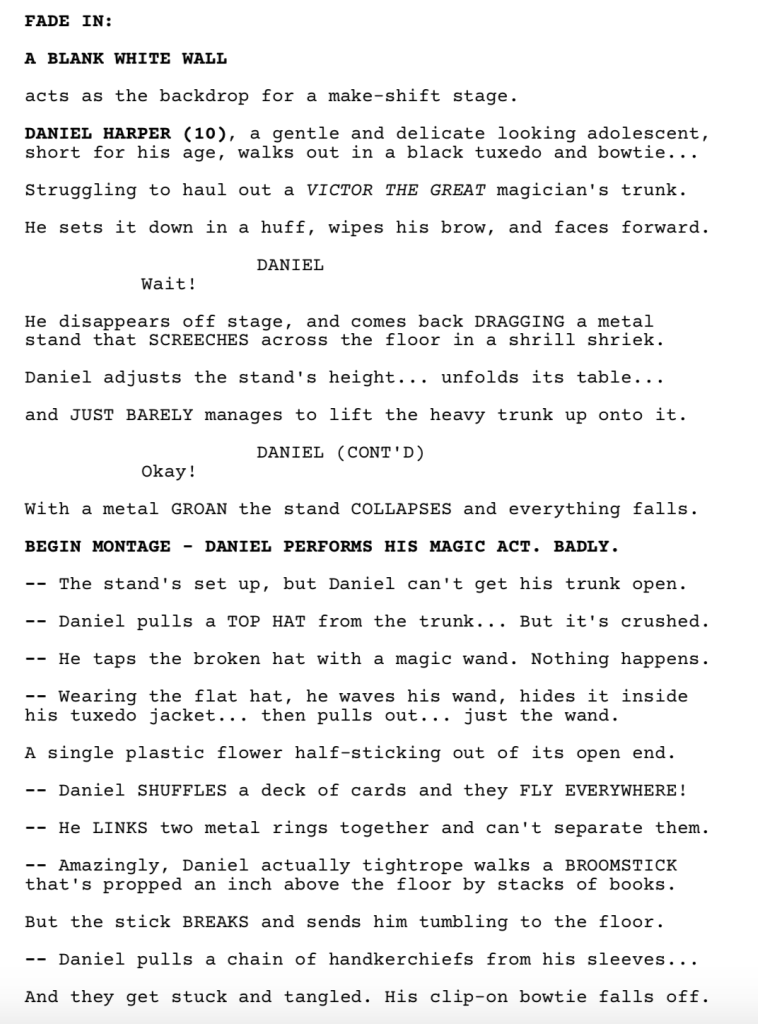Search Results for: amateur
I want to remind everybody who pitches their script for Amateur Offerings: DO NOT MENTION THAT YOUR SCRIPT IS OLD! I came across four entries that touted the fact that the script was “an old project of mine,” and “something I’ve been working on for a decade.” No. No no no no no no. That may be true. But don’t tell me that. Don’t tell ANYBODY that. People in Hollywood want THE NEXT BIG SHINY THING. They don’t want the old dusty thing. If you have a problem lying, then just don’t mention the age of the script at all. Present it as is. Come on, you guys should know this by now.
For those of you looking for an update on The Janitor (the last AO script winner, which blew me away), I’ve started sending it out to people. I’ll keep you updated on what happens along the way. Hopefully we’ll have some good news. And I would love for nothing more than to keep the good vibes going. So let’s find another impressive amateur screenwriter!
If you haven’t played Amateur Offerings before, pay close attention! Read as many of this weekend’s scripts as you can and VOTE for your favorite in the comments section. Voting closes on Sunday night, 11:59pm Pacific Time. Winner gets a review next Friday. — If you’d like to submit your own script to compete in Amateur Offerings, send a PDF of your script to carsonreeves3@gmail.com with the title, genre, logline, and why you think your script should get a shot.
Good luck everyone!
Title: Skin
Genre: Sci-Fi, Drama
Logline: Facing pressure from a controversial tech mogul and protests from angry students, an android with dark skin struggles to form a social identity while attending a historically black university.
Why You Should Read: Hey Carson. Have a new script that I plan to submit to competitions but I wanted to get some feedback from the toughest and brightest before going forward. Simplest way to describe my script would be “Dear White People” meets “Ex Machina.” I’m a huge fan of Spike Lee, racial satire and sci-fi with a social commentary and wanted to create a story that reflected all those influences. I also actively wanted to avoid the clichéd comedy-sketch type moments that one might expect from a film with this premise. And the moments of levity in the script are used primarily to enhance the characters. It’s a quick, easy read but it’s also challenging and thought-provoking. Thanks for the opportunity and I hope you enjoy.
Title: OUT OF DEATH
Genre: Thriller
Logline: An innocent prisoner and a compromised federal agent flee from two crooked local cops through the deep woods of Pennsylvania after an attempted frame job goes wrong.
Why you should read: The attached script is a low-budget contained thriller that’s received some great reviews on the Black List website. I’m a huge fan of Richard Wenk and his script for 16 Blocks and The Equalizer. I’ve tried to emulate some of that work here. It’s a fast-paced, sparsely written script, which centers around a female protagonist (ends up being a girl with a gun). I just read Blonde Ambition, which inspired the hell out of me to take some chances to get my stuff out there whenever I can (damn, if Madonna isn’t my own personal hero now). I appreciate your consideration.
Title: Black & White
Genre: TV Pilot – Crime drama
Logline: An outsider becomes the first black police officer in a small Louisiana town in the 1960s and has to navigate he and his family through the growing tensions of being pushed out by both blacks and whites, while tensions also mount because of the Vietnam War and the Civil Rights Movement.
Why You Should Read: I just optioned two scripts, one being the western that was reviewed on this site, and an action movie I wrote quite a while ago that I almost gave up on, both being directed by Chuck Russell who is a director I feel extremely lucky to have on board.
About this script: This is a story and subject I really wanted to tell. I was looking for something period that was relevant to today. I was originally going to write (and I still may) a Downton Abbey of the south, taking place during, or right before, the civil war. During my research I found a true story (in which this is based on) that tickled something inside me that said, “you need to tell this story!” So this is my take. — The first draft of this script made the top 1% of the Script Pipeline contest, though it didn’t make the top ten (super sad by the way!). They said that it was because they thought the subject matter would be a hard sell, though others don’t think that, so who knows. — Billy Ray also just read it and really liked it and we have a lunch set up in a couple weeks to discuss it. This is the draft that Billy read. I was going to make the change(s) he suggested, but decided to wait until he and I meet. I’m curious if the same note(s) comes up. I of course want to make this as good as I can. I want to know if it’s something people like and if it’s something they would keep watching. I’m a little nervous, but thanks for taking a look! — And I also need to say something – even if you don’t have a manager or an agent (of which I don’t have either at the moment) that it is still possible to get your stuff out there, and like me, possibly made. So don’t sit around and wait for an agent or manager to come around, make your own contacts, do your own work, get it out there, and get anybody who is anybody to read it… just please please PLEASE make sure it’s ready before you send it out!! lol Thanks guys! Hope you like it!
Title: A Killer Musical
Genre: Musical Horror Comedy
Logline: In 1985, an eager teen in search of an exciting summer signs up to work at a musical summer camp where counselors are stalked and murdered by an unknown assailant.
Why You Should Read: A Killer Musical is three things: a musical, a slasher movie, and a comedy, in that order. I wanted to have legitimate song and dance numbers to go along with the jump scares and brutal murders of a slasher film, all while keeping the humor from moving into Scary Movie territory where the characters behave as if they are aware that they are in a horror film. — This script is for everyone that has watched Friday the 13th and said to themselves, “Why aren’t there any song and dance numbers in this camp counselor murder romp?” — I’ve only been lurking Scriptshadow’s AOW for a short while and I haven’t seen a musical yet. Perhaps it’s time?
Title: Don’t Do It
Genre: Horror
Logline: Having exhausted all medical avenues to bring his wife out of her two year coma, a desperate husband opts for an illegal solution that will wake her up but with terrifying consequences.
Why You Should Read: We’re told that if we want the best odds of breaking in then it’s with a low budget horror script and so that’s the avenue I have been pursuing since the start of the year. With a small cast, very few locations, and a simple horror concept this is me playing the odds. The idea for this story began while reading about the sad case of Michael Schumacher, the millionaire racing car champion who is now cared for at home after a skiing accident left him in a coma several years ago. I thought about what his house must look like – the medical staff, the machines, and his poor family praying for him to wake up. This gave me the idea for Don’t Do It. . How far would you go to wake up the person you love?
It’s a wonderful and rare day here on Scriptshadow. We get to celebrate one of the very few IMPRESSIVE amateur scripts I’ve read for the site. Grab your popcorn and notepad. This should be fun!
Genre: Crime/Drama
Logline: A mob rib breaker turned high school janitor seeks to redeem his violent past by preventing a young girl from making the same mistakes he did, but when drugs and gangs overrun her school, he must risk his cover to clean it up.
Why You Should Read: Writing is the reason I get up in the morning. I have been a Nicholl Fellowship quarterfinalist multiple times, a Page semi-finalist and was the 2016 winner of Screamfest with my screenplay “Plum Island”. My day job working with troubled youths allows a consistent reservoir of unique experiences that I draw upon when creating realistic and fleshed out characters. Why read? “The Janitor” perfectly portrays human complexities in a gritty urban setting and creates cinematic characters that are both mythic and believable.
Writer: Matthew Lee Blackburn
Details: 113 pages
If you’ve been away from Scriptshadow for a few days, you missed that Friday I read a killer amateur script. It’s so rare that we get a great amateur screenplay, I didn’t want to rush a review out. I wanted to take my time, think about the script, then do it justice. Hence why you’re getting the review today.
The biggest surprise about The Janitor is that I’d almost given up on it by page 10. The script started out in a clunky manner, and since past experience tells me these scripts don’t get better as they go on, my mind began powering down. I was still going to read the script. But I wasn’t going to be 100% present.
And then something magical happened. We did a little time jump, began a new storyline, and introduced some of the most realistic characters and situations I’ve encountered in a screenplay all year. Another reminder that it’s possible to turn any reader around, no matter how tired or distracted they are, if you write a great script! Let’s take a look!
Despite his boss’s assumptions, Marty isn’t about to rejoin the criminal life that put him behind bars in the first place. Therefore, when he gets out, the first thing he does is steal a chunk of his boss’s money, buys a new identity, and disappears into rural America, where he eventually finds a janitorial job at Redimere Days, a high school that’s been racked by gangs and drugs.
After living with her grandmother for years, 14 year old Juliet Lloyd’s been sent back to her junkie mom and abusive stepdad’s house, where every day is an assault obstacle course. Her only escape is the 7 hours a day she spends at Redimere High. But as a new student who doesn’t know anyone, even that’s a rough experience.
So it’s nice when one of the popular kids, 18 year-old drug-dealer Mickey Kerr, takes an active interest in her. It’s clear to us that Kerr’s a no-good piece of shit. But with no positive life references, Juliet ends up trusting him. That trust nearly gets her raped by Kerr’s friends at a party. So the next day at school, Juliet beats the shit out of him in front of everyone.
The event puts her in line to be expelled, a decision Ruth, Juliet’s teacher and lone champion, begs the principal to reconsider. A compromise is made. Juliet can remain at school if she does a work study with the understaffed janitor, our friend Marty. Marty, the only person at this school who wants to be left alone more than Juliet, resists, but in the end, both must accept the arrangement.
You wouldn’t think that Juliet would enjoy cleaning toilets, but Marty is so kind, so helpful, that he quickly becomes the only person on the planet she can trust. When Marty learns that Juliet is getting beat up at home, he drives over to her house and frightens her stepdad so bad he pisses himself. Just as it’s looking up for Juliet and Marty, Marty’s old criminal gang finds out where he’s run off to. They show up in town with a simple goal: make Marty pay for ever thinking he could steal their money.
I’m sure a lot of you are asking the question: Why did Carson respond so well to this script as opposed to mine? What is this writer doing that I’m not? One of the things I’m constantly looking for in a screenplay is authenticity. Does what’s happening on the page feel like it represents real life? Or is it a facsimile of real life, a writer’s attempt to conjure up a reality he knows nothing about? 9 times out of 10, it’s the latter. Most writers are throwing characters and sequences on the page that are carbon copies of their favorite movies. They’re not digging into their own lives and giving us their own reality.
What I loved so much about The Janitor is that it feels like real life. For example, in a lot of screenplays, when there’s a kid who’s getting abused, writers will play it safe. Wherever there’s an abusive parent, they’re countered with a protective parent. That’s a very “movie-like” thing to do. You’re considering how the audience is going to respond. You’re considering the resistance producers might have to a 14 year old girl getting abused so intensely. So you wrap things in a buffer, a Hollywood safety net that lets everyone know: “It’s okay, everybody. This is just a movie.”
The Janitor doesn’t do that. The step-dad is an abusive lunatic. But the mom is just as bad. She doesn’t give a shit about Juliet. She’s high all the time. She screams at her nonstop. If the stepdad is swinging the bat, the mom’s placing the ball on the Tee. It was that setup that let me know, this world isn’t “Hollywood safe.” This is the real world, where sometimes people are placed in terrible situations where there are no lifeboats.
And Matthew, the writer, never shies away from this reality. There’s a scene in the script where the dad and Juliet are in his car and he’s mad at her and he just mashes her face into the window. It’s raw and unfiltered and real. And that’s what makes it resonate. But normally, I’d see this scene played safe. The stepdad might verbally abuse her instead. Or the violence might be off-screen. And I’m not saying there’s anything wrong with those choices. But the reason The Janitor works where so many other scripts don’t, is that it’s never afraid to be real. It’s not trying to hide anything.
A great side effect of authenticity is that it does wonders for your dialogue. If you’re mining the reality of a situation as opposed to making it up, characters talk more like real people. They’re more passionate, thoughtful, raw, unfiltered, genuine. And the great thing is, is that a lot of this dialogue writes itself. Remember, you only struggle to come up with words for your characters if you’re trying to artificially force words into their mouths. If you just let them speak, they’ll speak truthfully.
In this scene where Juliet’s mom accuses her of stealing her pills, you’ll see that there are no flourishes to anything anybody’s saying. It’s just one person wanting something and another person resisting. And when you have that, there are no long discussions. It’s a series of brutal clipped statements.
And this scene represents just how unflinching this script is. Juliet is living in a hellhole and we’re never given a break from that. We experience things as she experiences them. She gets attacked at school and needs to regroup? Tough cookies. She comes home and has to deal with her meth-head mom.
Now if you’ve been reading my site for awhile, you know the effect this has on the audience. Readers will always root for characters who are being harmed or taken advantage of. For that reason, we fall in love with Juliet immediately. We want to see her get out of this mess. It’s the driving force for why we must read til the end. To see that she escapes this hell on earth.
One of the tougher challenges with a script like this is finding a way to frame the plot. This isn’t a traditional goal-driven story. Sure, Juliet has to complete her work-study with Marty in order to remain at school, but that’s hardly a plot worth building a script around. So Matthew does something really clever. He creates this looming confrontation. We know that those guys from the beginning are coming back. You don’t get to steal a bag of money from a crime boss and not have to deal with it. So the fact that we know Marty’s going to have to fight off those guys at some point provides the script with a stealthy plot frame.
Remember, as long as we feel like we’re moving towards something big in a story, we’re engaged. GSU may be the easiest model to use. But it’s not the only model out there. It can be argued that The Janitor’s plot is a series of looming confrontations.
Speaking of the opening, that’s the only thing here Matthew has to fix. I noticed a few of you mention he should ditch the opening. But without the opening, we don’t have that looming threat anymore. So the opening needs to stay. But it has to be simpler. The problem is that a man we have no reference for is speaking in voice over. Three characters are introduced quickly afterwards. Everyone’s referring to backstory that we don’t understand. It’s no wonder we’re confused.
In these cases, I always tell the writer: What are the key pieces of information you’re trying to convey? Focus on those things and strip away everything else. All we need to know is that Marty just got out of prison, he used to work for these guys, he wants out, and he sees a way out with the money. Build a scene around that and strip away all the confusion.
But outside of that, I thought this script was spectacular. One of the best amateur scripts I’ve ever read on this site. It bumped right up against my Top 25, almost squeezing in. It very well may get there in the future. I’m going to be talking to Matthew tomorrow and I hope to help him take the next step in his writing career because he deserves it with this script.
Script link: The Janitor
[ ] What the hell did I just read?
[ ] wasn’t for me
[ ] worth the read
[x] impressive
[ ] genius
What I learned: The earlier in the script you are, the more hand-holding you have to do. The Janitor’s only slip up is this opening, where four characters we don’t know and who have a complicated backstory, are thrown at us in the middle of a murder. Something this complicated can’t be rushed through. You need to slow down and hold our hand more, walk us through it so we know what’s going on.
What I learned 2: You don’t have to hold our hand if you simplify the situation in the first place. I just want you guys to know that the simplifying option is always out there. If you’re having trouble explaining an intricate situation to the audience, such as this one, the solution might be to strip out the extraneous elements in order to make everything easier to explain.
What I learned 3: It’s important to note the marketing angle to this idea. The crime aspect. Without it, this is a straight drama, and therefore way more difficult to market. The crime angle makes this a movie as opposed to a screenplay.
Okay, so here’s the deal. I was exhausted when I started reading this. I almost stopped because I didn’t think I could give it a fair chance in the state I was in. I hated the opening. I was confused by what was going on. And then, out of nowhere, the script pulled me in. And it pulled me in DEEP. It’s too late for me to write out a review that honors a script this good. So I’m going to hold off my review until Monday.
In the meantime, I encourage everybody here to read the script. Not just so you can participate in Monday’s discussion. But so you know what a script that leaves an impression reads like. The character work here is – wow. The craziest thing is that I usually dislike scripts like this. So it’s going to be fun working out why this particular story succeeded with me where so many others failed. Feel free to leave initial comments on the script here. But please reserve your more substantial thoughts for Monday’s review. This script deserves a good discussion!
For those wondering what the script is like, I’d pitch it as A History of Violence meets Short Term 12.
Link to script: The Janitor
It’s going to be a loooooonnnnnng weekend. No Scriptshadow til Tuesday (Monday is a holiday here in the U.S.). But the good news is when I come back, I’ll be reviewing the book that just became the hottest project in town. I’m a quarter of the way through it, and the writing isn’t great. But both the main character and story are awesome. A reminder that you don’t have to be the best writer to break in. But you do have to be a good storyteller. That means crafting clever suspenseful plots with unique flawed characters. The hero in this story is about as flawed as they get. To be continued…
If you haven’t played Amateur Offerings before, read as many of this weekend’s scripts as you can and VOTE for your favorite in the comments section. Voting closes on Monday, September 3rd, 11:59pm Pacific Time. Winner gets a review next Friday. — If you’d like to submit your own script to compete in Amateur Offerings, send a PDF of your script to carsonreeves3@gmail.com with the title, genre, logline, and why you think your script should get a shot.
Title: Parking Enforcement
Genre: Buddy Comedy
Logline: When two forty year-old parking enforcement brothers uncover a Boston police department conspiracy, they must devise a way to take down the very people who control their shot at a badge. (Step Brothers meets 21 Jump Street)
Why You Should Read: Structure is always a great conversation in screenwriting and this remains my most outlined script to-date, so I’d love to see how that comes across to readers. I fell in love with this concept of Parking Enforcement, but in a Jonah Hill / Will Ferrell style comedy. Would anything that happens in this script happen in real life? Other than the cops being crooked? Not likely. But, I also wanted to make the central core of the script universally relatable — people who feel they are better than where they are and always striving to get to that place, no matter the label that is given to them by others. This is a goofball script meant for big laughs, but also with big heart, so I’d love to see if it resonates with the audience.
Title: The Janitor
Genre: Crime/Drama
Logline: A mob rib breaker turned high school janitor seeks to redeem his violent past by preventing a young girl from making the same mistakes he did, but when drugs and gangs overrun her school, he must risk his cover to clean it up.
Why You Should Read: Writing is the reason I get up in the morning. I have been a Nicholl Fellowship quarterfinalist multiple times, a Page semi-finalist and was the 2016 winner of Screamfest with my screenplay “Plum Island”. My day job working with troubled youths allows a consistent reservoir of unique experiences that I draw upon when creating realistic and fleshed out characters. Why read? “The Janitor” perfectly portrays human complexities in a gritty urban setting and creates cinematic characters that are both mythic and believable.
Title: Salvage
Genre: Horror
Logline: As a remote Alaskan town prepares for winter, a young woman from out of town is brutally killed at the motel, and the sheriff – still obsessed with the unsolved murder of his daughter six months earlier – embarks on an investigation that turns many in this tight knit community against him and leads him to suspect the woman’s death may be connected to his little girl’s tragic slaying.
Why You Should Read: I studied screenwriting at Writers Boot Camp and Hofstra University and have worked in the industry as a script reader, production assistant, casting assistant and agency assistant in between writing scripts which garnered me three agents over the years, two options, and actor attachments from the likes of Armand Assante and Eric Roberts. Alas, no actual sales yet. Salvage is my personal favorite, the original draft of which was largely written while heavily medicated following surgery.
Title: THE OPERATIVES
Genre: Action Spy Thriller
Logline: When a global terror plot is exposed, five top agents (from Russia’s FSB, Israel’s Mossad, China’s MSS, Britain’s MI6 and America’s CIA) are forced to work together to stop the threat.
Why You Should Read: I’m a screenwriter in Sydney and love writing true stories and thrillers. I took and stunt-driving course, started on my helicopter license, and boxing lessons. Learning to know what I write, rather writing what I know. THE OPERATIVES takes the locomotive intensity of Bourne and Bond, and creates a 5-man-band in the vein of Mission Impossible, Suicide Squad and The A-Team.
Title: Inky Magicat & The Lonely Magicians
Genre: Family Comedy
Logline: When the world’s greatest magician loses the magic talking cat that makes his tricks work, the timid boy who rescues her tries to reunite the cat with her family before their careers are ruined.
Why You Should Read: Inky Magicat is a never-ending joy ride featuring a wide array of likable and entertaining characters. With solid goals, stakes, urgency, and a strong dose of comedy sprinkled with grounded sequences of emotion inducing drama, Inky Magicat touches on themes of how crime doesn’t pay, and features a relatable coming of age arc to be enjoyed by people in all walks of life. Billed as PADDINGTON meets THE PRESTIGE, Inky Magicat is a four quadrant comedy suitable for international audiences, and we believe it has the potential to become a strong family movie franchise.
Genre: Drama/Thriller
Premise: When a young widow’s son mysteriously disappears in Crater Lake National Park she will have one week to find him before the snowy season begins & buries any trace.
Why You Should Read: Much of my writing has always been complex, so I took this opportunity to write something simple, short, sweet and a quick read. I call it Flightplan in the woods. Mother loses son and will do everything to get him back, but has everything in her way. Singular park location with limited characters, a mysterious level of suspense and intrigue, mixed with the paranormal. As this is my first foray into something this simple, I’d love to hear any feedback the group has and take in any suggestions.
Writer: Treaty
Details: 97 pages
It’s official “Kids Disappearing Weekend!” That’s right. If you’re looking for some entertainment, you can check out the computer screen missing daughter thriller, “Searching,” at your nearby multiplex. Or you can stay home, spend a lot less money, and read Crater Lake!
Today’s screenplay is as simple a movie premise as you’ll get. Son goes missing. Mom must find him. I talk about the importance of simple premises all the time. But when is a movie idea too simple? That’s the factor I’ve always struggled with. Because often I’ll read a script with a simple concept and be bored out of my mind.
I think Crater Lake answered that question for me. A movie is too simple when it’s both simple AND predictable. If we’re 40 pages ahead of the story the whole time, we’re going to be bored. So the trick is, when writing these uber-simple premises, to keep throwing in unexpected plot beats, misdirects, surprises, mysteries – anything that keeps the reader curious.
Crater Lake introduces us to 30-something therapist widow Zoey Hayes. After finishing up a weird session with a patient who believes in parallel worlds, Zoey heads home and starts getting ready for a weekend adventure with her 7 year old autistic son, Sam.
The two are going to national park, Crater Lake, where Sam will get to do his favorite thing in the world, take pictures of birds. The two have a perfect system going, with Sam dictating the majority of the operations and scheduling.
Driving along the highway on the way to the park, Zoey spots something in her rearview mirror and screeches to a stop. We never see what she saw, only Zoey jumping out and chasing after whatever it was. She comes up empty handed, chalks it up to her imagination, and the two complete the drive.
After setting up camp, Sam begins bird-watching, and Zoey walks down to check out a nearby stream. Only a few minutes pass, but when Zoey returns, Sam is gone. Zoey freaks out, running around and asking other campers if they saw her son. Nobody has. Soon she finds a park ranger, and a full-on search party is formed to look for Sam.
Strangely, there isn’t a trace of him anywhere. And when staunch female cop, Sheriff Collins, shows up, she’s not much help. In fact, she’s not even convinced Zoey is telling the truth. Nobody at the park saw her come in with her son. And there’s not a shred of evidence that he was in the spot where she supposedly last saw him.
As a result, Zoey is forced to go out into the park and find her son herself. It’s there where she meets mysterious hermit, Aaron Stevens, who it turns out lost his little girl to the park many years ago. According to Aaron, there are mysterious forces working in this park, and that Sheriff Collins has been covering up disappearances for years. Zoey doesn’t care about any of that. She just wants to find her son. Will she?
I absolutely loved the first half of Crater Lake for the reason I listed above. It was simple, but it kept you guessing. There were these great little mysteries tossed in every 10 pages. One of my favorites was them finding Sam’s camera miles away from where he’d supposedly last been seen coupled with us learning that Zoey had been secretly drinking the whole trip. Might she have been responsible for her son’s disappearance and not known it?
However, little things would pop up here and there that gave the impression the writer hadn’t put 100% into his story. The script was written to make us think they were in some remote park with no one around. However, the second Sam went missing, there were all of a sudden a million campers to talk to. Whether they’re isolated or around people is an important detail to establish in a missing kid script. We shouldn’t be finding out there were all these people around after the fact.
Or one second Zoey has an asthma inhaler and the next second it’s gone. Not just gone but completely irrelevant. She never had a single moment from that point on where she struggled to breathe. So why bring up the inhaler in the first place?
Whenever I see stuff like this, I get worried. Especially in mysteries. Because mysteries are all about intricately plotting a story to have a shocking, but more importantly, satisfying, final reveal. So if the writer is flippant about the small stuff, they’re going to be flippant about the big stuff as well.
Sure enough, the ending didn’t live up to the hype. The story introduces this notion of the park being a supernatural place where people can transfer to parallel worlds. The rules for these parallel worlds were fuzzy at best. There was a vague implication that water was how the worlds connected. And… well, that was all we got. Not to mention we’re learning these rules with, like, ten pages to go.
Naturally, when it came time to explain where Sam was, the fuzziness took over, leading to an unsatisfying ending that was a big let down. And I say that because I was so invested in Sam’s survival. That alone is so hard to do – make a reader care about a fictional person who’s an accumulation of words. So when a writer accomplishes that, yet botches the ending, you’re so mad.
With that said, the script is worth developing. I would ask Treaty to consider a draft without the supernatural stuff. OR. Or you can have the hermit believe in the parallel worlds theory, and tease that as a possibility, but in the end it turns out it’s something he’s using to cope with what he knows, deep down, to be true – that his daughter is dead.
I think the better storyline is beefing up Sheriff Collins. She’s a villain with a huge upside. I saw her as a potential rival to Nurse Ratchet for best female villain of all time. If you could build a scenario by which she’s orchestrating all this to cover her ass, and has been doing so for years, that could be a really satisfying ending.
Oh, and you also HAVE to do more with the lost camera. Lost cameras with full rolls of a film in them are gold mines as far as creating mystery. There should be several weird pictures on there that don’t make sense and only lead to more confusion.
There’s SOMETHING to this script. No doubt about it. But right now it feels like a speed-draft where the writer hasn’t done his due diligence of exploring the full potential of the story.
Script link: Crater Lake
[ ] What the hell did I just read?
[x] wasn’t for me
[ ] worth the read
[ ] impressive
[ ] genius
What I learned: Act like you’re going to give the audience an answer, then make them wait for it. Treaty does a TREMENDOUS job of using this device. It was one of the main reasons I stayed so invested in the story. For example, Zoey informs a young ranger who’s helping her about the hermit, whose daughter also went missing mysteriously. So we watch the ranger look this up. And we see him find the story, and he’s about to read it, and we’re about to find out what really happened with this weird recluse and his daughter and right as we’re about to get our answer… we cut back to Zoey’s pursuit of her son. Noooo! Now we have to keep reading before we can find out the truth about the daughter’s disappearance.


